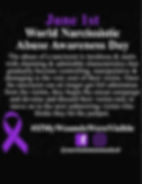Supporting World Narcissistic Abuse Awareness Day
- Kate Harper
- Feb 13, 2024
- 5 min read
Updated: Oct 19, 2025
There are four Cluster B personality disorders with Narcissism at their core: borderline personality disorder, narcissistic personality disorder, histrionic personality disorder and anti-social personality disorder (sociopathy or psychopathy). Narcissism is characterised by a lack of empathy, a sense of entitlement, a desire for power and control and a disregard for or violation of the rights of others.
Cluster B personality disorders are more prevalent in prison populations than in the general population and are strongly associated with violent crimes and crimes against the person including homicide, domestic abuse, stalking, fraud, drug offences and arson. Despite this, our governments, institutions, legal system, education system and the media continue to encourage and enable narcissism while ignoring the increasingly prevalent and devastating long-term effects of narcissism and narcissistic abuse on society at large.

World Narcissistic Abuse Awareness Day is an annual observance observed every first of June dedicated to shedding light on the often hidden but deeply impactful issue of narcissism and narcissistic abuse.
Narcissistic abuse can take many forms including psychological, verbal, emotional and physical. This type of abuse can come from a narcissistic parent or other family members, a romantic partner, a friend, a neighbour or even a boss or co-worker.
While everyone has some narcissistic tendencies, narcissism is when these tendencies are severe, pervasive, long term and impact relationships and everyday life.
The cycle of narcissistic abuse is a pattern of behaviours used by a narcissist to progressively gain control of, dominate and exploit their target to regulate their self-esteem. The cycle typically consists of a four-stage pattern: idealization, devaluation, discard, and hoover. Post-separation abuse is also common and involves the narcissistic ex-partner using various tactics to exert control, intimidate, manipulate, or harm the other partner, even though they are no longer together.
The ultimate goal of the cycle of abuse is to destroy the target and affirm the power, control and omnipotence of the narcissist. Financial gain is frequently an accompanying motive.
Warning signs of narcissistic abuse include the following manipulation and control tactics:
Love-bombing and future faking - creating the illusion of high investment and strong interest to deceive the target into a relationship.
Pathological lying and gaslighting - constant lies and gaslighting to manipulate the target into doubting their own perspective, feelings and reality.
Triangulation - introducing a third party, such as an ex-partner or friend into the relationship to create a sense of competition, jealousy, and insecurity.
Intermittent reinforcement - hot and cold treatment to strengthen the trauma bond and create a psychological and bio-chemical addiction to the narcissist.
Threats of suicide and emotional blackmail - threatening to harm themselves or take drastic actions if the other person does not behave how they want.
Playing the victim - claims such as awful exes, childhood abuse and physical or mental health issues to elicit sympathy and avoid responsibility for the abuse.
Isolation - monopolizing the target's time, undermining other relationships, controlling finances, moving to a remote location or different country to cut off support.
Passive aggression - disguised verbal hostility, relational hostility, silent treatment, stonewalling, blaming, stalling, covert resistance, underhanded sabotage.
Sleep deprivation - depriving the target of sleep to diminish brain functionality and thought clarity, and put them into a “fog” like state.
Narcissistic rage - road rage, rage fits, damaging property and threats of harm or violence to keep the target fearful and compliant and stop them from leaving.
Baiting and "bait and switch" - creating arguments with the goal of provoking the target into reactive abuse which can then be exploited by the narcissist.
Scapegoating - parents who use narcissistic manipulation may place all the blame on one child they designate as a scapegoat.
Stalking - surveillance, monitoring, watching, following, turning up uninvited, cyber-stalking and "gang stalking" to maintain their grip on the target, further invading their privacy and sense of security.
Smear campaigns - tarnishing the target's reputation, manipulating other people ("flying monkeys") to spread malicious rumours, harass the target and carry out abuse by proxy.

Over time, victims experience specific emotions indicative of an abusive narcissistic relationship:
Dissociation as a survival mechanism - disconnection from thoughts, feelings, memories, or surroundings as a defence against overwhelming stress or trauma.
Confusion or "brain fog" - the emotional roller coaster of the cycle of abuse, cognitive dissonance and sleep deprivation impairs the victim's brain function.
Fear and walking on eggshells - the abuse and unpredictability leave the victim fearful of the abuser’s reactions or the consequences of any challenge to the abuse.
Emotional turmoil - the continuous cycle of abuse results in emotional exhaustion and intense emotional turmoil in victims.
Isolation - trapped and isolated victims believe they have no one to turn to for help or validation.
Self-doubt - the constant criticism, gaslighting, and manipulation lead to victims questioning their perceptions, memories, and even sanity.
Suicidal ideation - victims of intimate partner violence are twice as likely to attempt suicide multiple times (McKeon,2014).
Some of the long-term health conditions narcissistic abuse can lead to are cardio-vascular disease; obesity; arthritis; high blood pressure; type II diabetes; substance dependency; behavioural addictions; insomnia; fatigue; depression; headaches; gastrointestinal diseases; ulcerative colitis; thyroid or adrenal problems; anxiety, panic attacks and PTSD.
Other devastating outcomes of narcissistic abuse are narcissistic parental alienation syndrome; loss of property and other assets; identity theft; suicide attempts and suicide.

What causes narcissism? It is a mixture of genes, early childhood experiences and psychological factors. Studies suggest that narcissism in children is cultivated by parental overvaluation: parents overindulge the child, believing them to be more special and more entitled than others.
Are narcissists aware that their behaviour is wrong? It would seem so. Narcissists wear a public 'mask' to disguise who they truly are and take care to ensure their abuse is carried out behind closed doors. They also deliberately deceive their targets from the outset. The behaviour is therefore a choice.
Is narcissism evil? Evil is hurtful to others. Narcissists choose to damage people psychologically, emotionally, spiritually as well. The psychiatrist and writer M. Scott Peck in his book, People of the Lie: Toward a Psychology of Evil, stated "Laziness and narcissism are at the very root of human evil" (1983). From a theological perspective, pride (the root of narcissism) is the reason for Satan's downfall. Pride is also the source of the remaining six of the seven deadly sins.
Can narcissists change? The prognosis is poor, which is why acknowledgement of the issue and prevention is critical. Theoretically, change is possible, but the will to change must be self-driven. Ultimately, the greatest barrier to change is the arrogance and pride inherent in narcissism.
How can narcissists be identified? In the field of Psychology, severe and pervasive narcissism is defined and diagnosed as Narcissistic Personality Disorder (NPD) according to a set of criteria, with three main sub-types: Overt (Grandiose), Covert (Vulnerable) and Malignant. NPD is often co-morbid with other disorders (such as Borderline, Histrionic, or Antisocial personality disorders), substance abuse and other reckless and impulsive behaviours. In the case of Malignant Narcissism, narcissistic traits are combined with Psychopathy, Sadism and Machiavellianism.

We see the far-reaching impact of malignant narcissism all around us, yet narcissism is being encouraged by parents, and promoted by the media, corporations and all our institutions. Raising public awareness of the devastating long-term effects of narcissism and narcissistic abuse is urgent and long overdue.
More details on how to support World Narcissistic Abuse Awareness Day can be found at: https://wnaad.com.
Further information about narcissism and Cluster B personality disorders can be found at "People of the Lie" on Facebook: https://www.facebook.com/profile.php?id=61561025034195
USEFUL RESOURCES:
Narcissistic abuse recovery channels on YouTube:
Dr Ramani - https://www.youtube.com/@DoctorRamani
Prof. Sam Vaknin - https://www.youtube.com/@samvaknin
Narc Con - https://www.youtube.com/@NarcCon
The Little Shaman - https://www.youtube.com/@thelittleshamanhealing
Books:
"People of the Lie" by M. Scott Peck.
Further Thoughts:
Academy of Ideas "The Psychology of Malignant Narcissists - People of the Lie" - a short video on the far-reaching impact of malignant narcissism in politics.


